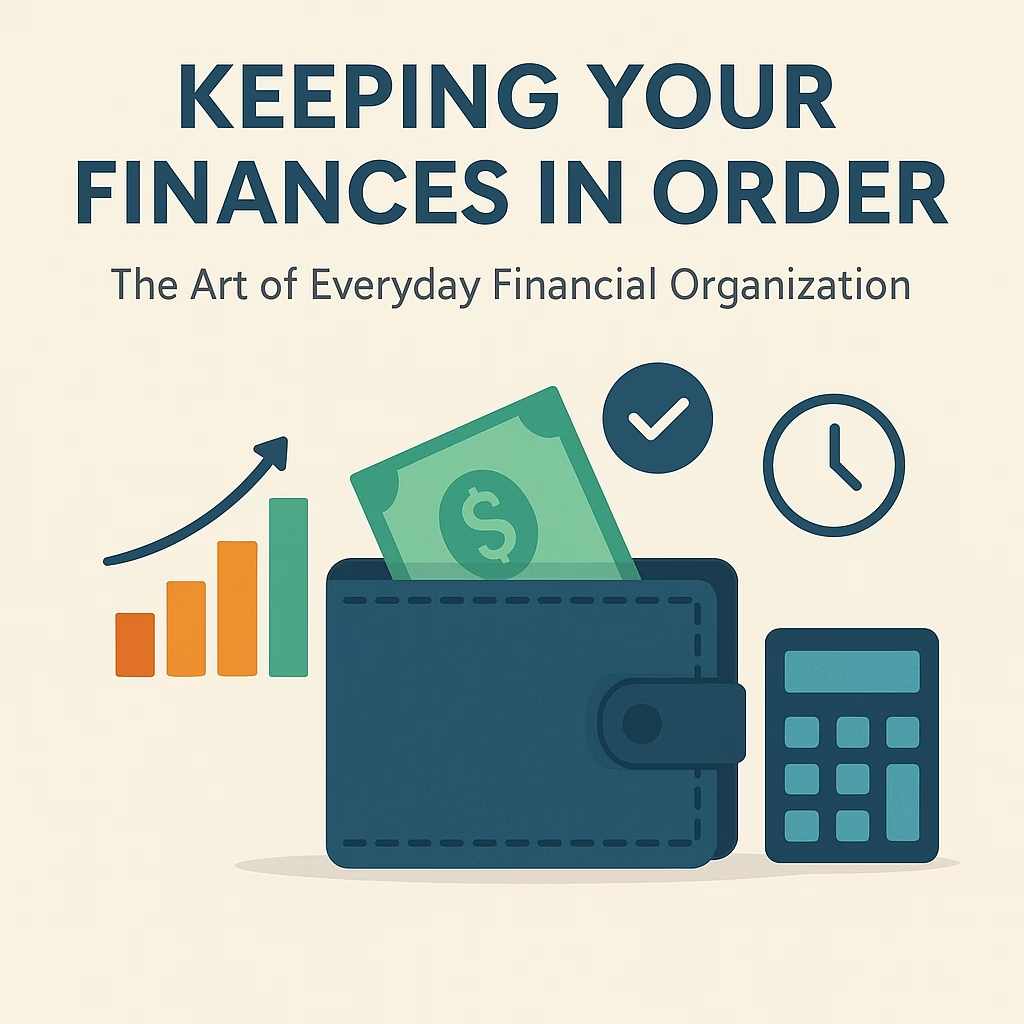In a world where expenses come fast and income often feels like it disappears just as quickly, learning how to keep your finances in order is not just a skill — it’s a survival strategy. Financial organization isn’t about being perfect or having tons of money; it’s about being intentional with what you have, creating balance, and preparing for both the expected and the unexpected.
Why Everyday Financial Organization Matters
Most people think of finances as something complex — reserved for accountants, investors, or people who love spreadsheets. In reality, financial organization is about small, daily habits that help you gain control and peace of mind. When you know where your money goes, you can make better decisions, reduce stress, and create a lifestyle aligned with your values.
Poor financial organization often leads to overspending, missed payments, and constant anxiety about the future. On the other hand, consistent organization helps you reach goals faster, whether it’s paying off debt, building an emergency fund, or planning that dream trip.
Step 1: Track Every Expense — No Exceptions
The foundation of organized finances is awareness. You can’t manage what you don’t measure.
Start by tracking every dollar that leaves your account. Use digital tools like Mint, YNAB (You Need A Budget), or even a simple spreadsheet. The goal is to see your spending patterns clearly.
When you start tracking, you’ll notice small leaks — that $4 coffee, the unused subscription, or impulsive late-night online buys. Over time, this awareness helps you redirect money toward what truly matters.
Pro tip: Categorize your expenses (food, transport, rent, entertainment, etc.) and review them weekly. A 10-minute check-in each Sunday can completely transform your financial organization.
Step 2: Create a Realistic Budget That Matches Your Lifestyle
Budgets get a bad reputation — most people see them as restrictive. But a well-designed budget is actually a freedom tool.
It tells your money where to go instead of wondering where it went.
A simple 50/30/20 rule works for many:
-
50% of income → essentials (housing, food, bills)
-
30% → lifestyle choices (entertainment, hobbies, personal spending)
-
20% → savings and debt repayment
Adjust these percentages based on your situation. The key is to build a financial organization system that supports your lifestyle instead of fighting against it.
Step 3: Automate Everything You Can
Automation is the hidden hero of financial organization. Setting up automatic transfers for savings, investments, and bill payments saves time, reduces stress, and prevents late fees.
Here’s how to automate wisely:
-
Schedule your bill payments right after payday.
-
Set recurring transfers to your savings or investment accounts.
-
Use reminders for non-automated obligations like rent or credit cards.
When your finances run automatically, you minimize the emotional energy spent on managing money and eliminate most opportunities for error.
Step 4: Build an Emergency Fund
A solid financial organization plan includes safety nets. An emergency fund protects you from life’s surprises — job loss, car repairs, or medical bills.
Aim for at least three to six months of essential expenses in a separate, easily accessible account.
If that sounds impossible, start small. Even saving $10 a week builds momentum. The point isn’t perfection; it’s consistency.
Remember: an emergency fund isn’t just money — it’s peace of mind.
Step 5: Simplify Your Accounts and Bills
If you have multiple bank accounts, credit cards, and subscriptions, financial organization becomes messy. Simplify.
-
Close unnecessary accounts.
-
Consolidate debt where possible.
-
Cancel services you don’t use.
Less clutter equals less confusion. Managing fewer financial “moving parts” helps you stay consistent and reduces the risk of missing payments.
Step 6: Review and Adjust Regularly
Your finances aren’t static — your life changes, so your budget should too. Review your financial situation monthly or quarterly. Ask yourself:
-
Am I spending according to my priorities?
-
Did my income or expenses change?
-
Am I saving enough for my goals?
This ongoing review keeps your financial organization alive and adaptive. Think of it as tuning your financial instrument — it keeps your system in harmony as circumstances evolve.
Step 7: Invest in Your Financial Education
The more you understand how money works, the more power you gain over your finances. Financial literacy is an investment that pays for life.
Read books, listen to podcasts, or follow credible finance educators. Learn about topics like compound interest, investing basics, and debt management.
Even spending 15 minutes a day learning about financial organization can help you make smarter decisions and avoid costly mistakes.
Step 8: Align Your Finances With Your Values
Money isn’t just about numbers — it’s about purpose.
When your financial organization reflects your personal values, spending becomes intentional, and saving feels rewarding rather than restrictive.
Ask yourself:
-
What do I truly value?
-
Does my spending reflect that?
For example, if freedom and experiences matter more than possessions, allocate more to travel and less to material goods.
Organized finances empower you to live according to your principles, not just your paycheck.
Step 9: Plan for the Future, Even if It Feels Far Away
Whether it’s retirement, buying a home, or starting a business, your future goals deserve a place in today’s budget.
Good financial organization isn’t just about today — it’s about setting yourself up for stability and freedom later.
Start small:
-
Contribute to retirement accounts (like 401(k) or IRA).
-
Invest regularly in low-cost index funds.
-
Revisit long-term goals each year.
Small, consistent actions compound into major results over time.
Final Thoughts: Order Brings Freedom
Keeping your finances in order isn’t about being rich — it’s about being free.
It’s knowing that your bills are paid, your goals are clear, and your future is secure. With consistent financial organization, even modest incomes can create meaningful, balanced lives.
Start today: track, plan, automate, and adjust.
Your future self will thank you for the discipline you practice right now.
Book about Financial Organization






